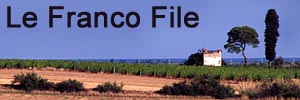I am very pleased to say that last night we were lulled to sleep by a satisfying chorus of croaking frogs in the Fanjeaux lake. Clearly senior (erstwhile) farmer Marcel has not managed to manges tous les grenouilles. A couple of years ago Marcel began a concerted campaign, based around his ample stomach, seriously to reduce the admittedly overcrowded frog population. Whilst some campers found the nightly croaking disturbing, most of the regulars consider it to be an enjoyable, integral part of Fanjeaux. Indeed, no frogs, no Fanjeaux. So, we were pleased to hear a decent, albeit reduced, overnight chorus.
However, I think that there is a sinister trend just beneath the surface. On previous years we have seen humongous tadpoles in the lake along with many small froglets in and around the lake. This year, however, the younger, replacement generation seems to be absent. We have not seen a single tadpole, nor have we seen a particularly small frog. My fear is that the frogs’ breeding success is now almost non existent. I would, of course, blame the voracious fish for vacuuming up any frog spawn and tadpoles, should any happen to hatch. So, does our frog chorus have a limited life based upon the natural lifespan of a frog? At least Marcel appears to have stopped trapping them.
Whilst there may be a complete lack of birdlife on the lake, the same is mercifully not true of the surrounding poplar and ash trees which still support a good variety of oiseaus. We frequently hear the “inverted wolf-whistle” [my description] of the secretive Golden Oriole. A glimpse of this stunning bird would be most welcome but rarely comes. Making the resident Chaffinches sound rather dull, there are a good number of Blackcaps warbling away entertainingly. Most delightfully however, this morning we were awoken at 6:00 AM by the piercingly tuneful call of a Nightingale. It began in the bushes demarking one side of Guillaume’s pitch, then gave a repeat performance from the bushes of the opposite side of Guillaume’s pitch, before moving slightly further afield for a reprise or two. Birds marking out their territory is a bit like beating the bounds. We’ve heard Nightingales singing before but not at such close quarters. The song variation and detail revealed by such close proximity was a revelation. It’s certainly a much more pleasant alarm call than that of a cockerel. Alarm clocks should contain recordings of Nightingales.
Having been comprehensively Nightingaled awake, I encouraged Francine out, as she had threatened, to play with some early morning light, photographically, that is. The narrow road leading up to the farm runs beside a raised field of onions, the heads of which had proved an irresistible draw. She also found a few splashes of colour framed by a corn field or two that grabbed her attention.
One of the attractions of camping on the farm site is the variety of activities and subjects that can provide entertainment, assuming that one takes an interest in such things.




Leave a Reply